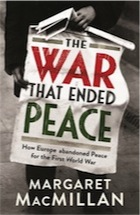The War That Ended Peace: The Road to 1914 by Margaret MacMillan – review
What role did honour play in the outbreak of the first world war?

Poppies in a field at Le Hamel, France. Photograph: Glenn Harper/Alamy
Archduke Franz Ferdinand of Austria was assassinated on 28 July 1914 in Sarajevo. This set in train the July Crisis, the moves and counter-moves that would lead to general European war, the "great black tornado", as Theodore Roosevelt called it. Sixty-five million men served in the conflict, 9 million of them died and 20 million were wounded. The war was one of history's great turning points, the beginning of what Eric Hobsbawm dubbed the "short 20th century" (which ended in 1989). It brought down four European empires and weakened the colonial powers that ended on the winning side, Britain and France; it spawned communism and fascism, and changed relations between Europeans and non-Europeans, town and country, governments and peoples, men and women.
While there is broad agreement about the consequences of the war, the causes have always been contentious. Who, or what, was to blame? What role do we attribute to underlying trends such as militarism, the arms race and imperialist rivalry? How important was the system of alliances that divided Europe into two armed camps? Then there is the question of which power or powers carry the greatest responsibility for the coming of war. The victorious allies stuck the blame on Germany at the Versailles Peace Conference, in the "war guilt clause". The idea that Germany was the prime mover has enjoyed a brilliant, if chequered career ever since. It was widely questioned in the interwar years, not only in Germany but in Britain and the US (although not in France). After Hitler's war, though, English-speaking historians were more likely to see a pattern of German aggression stretching back before 1914, and in 1961 the Hamburg historian Fritz Fischer made the controversial case (bitterly opposed by most German historians) that Germany had mounted a pre-emptive strike. The "Fischer thesis" became the orthodoxy for a while, but has been plausibly challenged in recent years by historians who have pointed the finger almost everywhere except at Berlin. The current consensus seems to be that there is no consensus. There is, finally, the question of the decisions made by a score or so of men (and they were all men) in half a dozen capitals. Did it matter that during the July Crisis both Austria-Hungary (Berchtold) and Russia (Sazonov) had foreign ministers who were weaker and less decisive than their predecessors? Would it have made a difference if Austria's chief of staff Hötzendorf had been less of a fire‑eater or German chancellor Bethmann-Hollwegless of a fatalist? In our post‑structuralist age, the importance of individuals within the decision-making process has returned to centre stage, along with counterfactual ("what if?") history.
These thoughts are prompted by reading Margaret MacMillan's richly textured account of the road to war. Her title draws attention to the fact that Europe had seen no major war for decades before 1914, although some powers had fought in limited conflicts – Britain in South Africa, Russia against Japan. Besides, the rapidly globalising world of the last pre-war years was meshed together by trade and communications. The War That Ended Peace begins with a scene-setting prologue on the Paris Exposition of 1900, a perfect symbol of contemporary pride in material and moral progress, a gathering "destined" – as the Berlin chamber of commerce wrote to its Parisian counterpart – "to bring the civilised nations of the world nearer to one another in the labours common to them all". Why, asks MacMillan, would Europe want to throw it all away? Her answer falls into three parts. The first third of the book outlines the great diplomatic realignment of Europe, as the entente cordiale of Russia, France and Britain formed against the Triple Alliance of the Central Powers – Germany, Austria-Hungary and their unreliable, semi-detached ally, Italy. These pages pack in an awful lot of detail and lack forward momentum, but MacMillan writes engagingly and includes many enjoyable anecdotes. There are also sharp character sketches – of the oily foreign minister and later chancellor Bernhard von Bülow, for example, a sort of poor man's Bismarck who demanded a German "place in the sun", or Britain's energetic First Sea Lord, "Jacky" Fisher, who took his pleasures from the Old Testament, dancing and naval efficiency.
These opening chapters sound one of the book's major themes – the fact that alliances conceived as defensive by those who make them can easily appear offensive to others. It is hardly surprising that Germany complained about "encirclement" when democratic France and Britain jumped into bed with autocratic Russia, especially given the recent history of imperial conflicts between Britain and both of its new allies. Britain and Russia took so long to negotiate their 1907 agreement because each "thought the other a liar and a thief", said one British diplomat. Yet the French-Russian agreement and Britain's move away from "splendid isolation" were driven by perceived vulnerability, including fears of Germany. MacMillan tells the familiar story of Germany's self-defeating foreign policy well – the attempt to keep a "free hand" that ended up alienating Britain and Russia alike, the Kaiser's many damaging pronouncements, the Tirpitz Plan that initiated a naval race with Britain. She also talks about the problem of Germany's Austro-Hungarian ally. Not for nothing did the German ambassador in Vienna ponder whether it was "really worth it to attach ourselves so firmly to this state which is almost falling apart".
In the middle of the book MacMillan considers the larger context within which the final approach to war occurred. She is good at painting the intellectual background ofSocial Darwinism, fears about "degeneration" and the belief in some quarters that war might bring rejuvenation after what German poet Stefan George called the "cowardly years of trash and triviality". This was the flipside of the materialist complacency on display at the Paris Exposition. Readers will also find excellent accounts of popular jingoism, the yellow press and the hardening of national stereotypes in these years, as well as both militarism and the peace movements that opposed it. And the plans made for war? No straight line led from the Schlieffen Plan, the Russian Plan 19A or the French Plan XVII to war, yet the elaborate programmes for mobilisation became harder to reverse or modify, and they cut down the amount of time available to political decision-makers in a crisis.
The crises that punctuated the years after 1905 dominate the final part of the book – crises over Morocco, and crises, above all, in the volatile Balkans, where the newly independent state of Serbia exercised a powerful attraction on South Slavs living within the Austro-Hungarian Empire, and where Austrian and Russian interests clashed head-on. The repeated standoffs made decision-makers jittery and prepared Europeans psychologically for war. Each crisis also left behind resentment, especially in Berlin, Vienna and St Petersburg, where rulers, military and civilian leaders felt that they had been the ones to back down, that the other side had done better. Radical nationalists everywhere amplified the resentment, making it more difficult for political leaders to display caution in the next crisis. And yet, paradoxically, the fact that these crises had somehow been weathered induced complacency when the assassination came in July 1914. Surely, once again, Germany would hold back Austria and Russia would be restrained by its western allies? Instead, the alliances held and sent the powers tumbling one by one into war after Austria issued its notorious ultimatum to the "Serbian scallywag" on 23 July. MacMillan deals very well with the July Crisis and distributes the responsibility widely. It was created by Serbian irresponsibility (although she stops short of calling Serbia a rogue state, as Christopher Clark has done), Austrian vengefulness and the "blank cheque" the Kaiser issued to Vienna (before changing his mind as conflict approached). But she recognises how British, French and especially Russian actions exacerbated the crisis, and rejects the view that this was a German pre-emptive strike, a "flight forward" from domestic strife into war, while arguing that German policies recklessly and knowingly risked war. I think she is right on both counts.
Two things struck me as I read this vivid account of the dreadful final days before the war broke out. One is that, even as some of the main actors expressed their distress at what they feared was coming (Tsar Nicholas II talked of a "monstrous slaughter", Bethmann-Hollweg of a "mad European war", Lloyd George was "filled with horror at the prospect"), a certain sense of honour prevented any retreat. We encounter that word repeated again and again in all the European capitals, even in Brussels, where Albert I told his people: "We refused to forfeit our honour." Then, contrast all this manly honour with the tears shed by the ambassadors taking leave of their hosts – Count Pourtalès, German ambassador in Russia; Prince Lichnowsky, German ambassador in London; Edward Goschen, British ambassador in Berlin. But who can be sure exactly what they were weeping for in midsummer 1914?
• David Blackbourn's books include The Long Nineteenth Century: A History of Germany 1780-1918.

No comments:
Post a Comment